|
|
|
Sort Order |
|
|
|
Items / Page
|
|
|
|
|
|
|
| Srl | Item |
| 1 |
ID:
130269
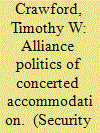

|
|
|
|
|
| Publication |
2014.
|
| Summary/Abstract |
This article examines the challenges allies face in coordinating diplomatic efforts to accommodate and peel off their main enemy's Potential Allies. It elucidates the key dimensions, and the underlying Coordination Dynamics, of this problem of "concerted accommodation," and it develops propositions about the conditions that shape the efficacy of such efforts. The argument links allies' strength to their divergent or convergent assessments of the target state's ability to tip the war toward victory or defeat. Divergent assessments foster weak allied efforts that are likely to fail, but when allies agree that the target is a potential "war-tipper," they will support their concerted accommodation policy with more robust cooperation that is more likely to work. The causal arguments and mechanisms are examined in a paired comparison analysis of two First World War cases: the Entente's efforts to induce (1) Ottoman neutrality and (2) Italian intervention.
|
|
|
|
|
|
|
|
|
|
|
|
|
|
|
|
| 2 |
ID:
130263
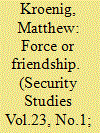

|
|
|
|
|
| Publication |
2014.
|
| Summary/Abstract |
Why do great powers take such different approaches to the issue of nuclear proliferation? Why do states oppose nuclear proliferation more vigorously in some cases than in others? In short, what explains great power nonproliferation policy? To answer these questions, this article tests two competing theories of nonproliferation policy. The first, political relationship theory, suggests that states oppose nuclear proliferation to their enemies but are less concerned when friends acquire nuclear weapons. The second, power-projection theory, argues that states oppose the spread of nuclear weapons to states over which they have the ability to project military power because nuclear proliferation in those situations would constrain their military freedom of action. In contrast, states will be less likely to resist, and more likely to promote, nuclear proliferation to states against which they cannot use force. To test these hypotheses, this article uses evidence from great power nonproliferation policy from 1945 to 2000. While both theories find some support, the power-projection theory performs significantly better. The findings of this article have important implications for international relations theory and US nonproliferation policy.
|
|
|
|
|
|
|
|
|
|
|
|
|
|
|
|
| 3 |
ID:
130271
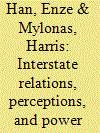

|
|
|
|
|
| Publication |
2014.
|
| Summary/Abstract |
Why do multi-ethnic states treat various ethnic groups differently? How do ethnic groups respond to these state policies? We argue that interstate relations and ethnic group perceptions about the relative strength of competing states are important-but neglected-factors in accounting for the variation in state-ethnic group relations. In particular, whether an ethnic group is perceived as having an external patron matters a great deal for the host state's treatment of the group. If the external patron of the ethnic group is an enemy of the host state, then repression is likely. If it is an ally, then accommodation ensues. Given the existence of an external patron, an ethnic group's response to a host state's policies depends on the perceptions about the relative strength of the external patron vis-à-vis the host state and whether the support is originating from an enemy or an ally of the host state. We present five configurations and illustrate our theoretical framework on the eighteen largest ethnic groups in China from 1949 to 1965, tracing the Chinese government's policies toward these groups, and examine how each group responded to these various nation-building policies.
|
|
|
|
|
|
|
|
|
|
|
|
|
|
|
|
| 4 |
ID:
130264


|
|
|
|
|
| Publication |
2014.
|
| Summary/Abstract |
Is the nuclear domino theory historically valid? Despite its longstanding centrality to thinking on nuclear proliferation amongst scholars and policymakers, in recent years a revisionist consensus has emerged in opposition to this traditional view. Based on an analysis of historical evidence from the aftermath of the 1964 Chinese nuclear test, this article argues that scholars have gone too far in rejecting the nuclear domino theory. Reactive proliferation has been more prevalent than commonly believed, and while it is true that only India acquired a nuclear arsenal in response to the Chinese test, to a significant extent this is precisely because the United States was aware of the danger of reactive proliferation and worked to stop it. Finally, the historical evidence suggests that the nuclear domino theory is compatible with both domestic and prestige motivations for proliferation in addition to the security motives normally associated with the theory.
|
|
|
|
|
|
|
|
|
|
|
|
|
|
|
|
| 5 |
ID:
130275
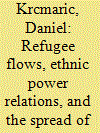

|
|
|
|
|
| Publication |
2014.
|
| Summary/Abstract |
Why do some refugee flows cause conflict in the host state and others do not? Drawing on bargaining models of war, I argue refugees are especially likely to cause conflict when they alter the host state's ethnic balance of power. More specifically, I explain why multiple informational and commitment problems arise when refugee flows produce a rapid shift in relative power between ethnic groups. As an empirical strategy, I examine a unique controlled comparison made possible by the influx of Kosovar refugees into Albania and Macedonia in 1999 that eliminates over a dozen competing explanations for civil conflict. I then use process tracing to demonstrate how a change in relative power between ethnic groups fostered violence in Macedonia, whereas the preservation of the ethnic balance facilitated a peaceful refugee flow into Albania. This evidence, though tentative, indicates that a refugee flow's effect on the host state's ethnic balance of power can help explain whether the state experiences peace or conflict.
|
|
|
|
|
|
|
|
|
|
|
|
|
|
|
|
| 6 |
ID:
130266
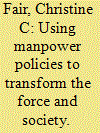

|
|
|
|
|
| Publication |
2014.
|
| Summary/Abstract |
Military manpower policies have an impact beyond the garrison. Policymakers have long held that military service can darn social fabrics that have been rent by ethnic, communal, class, and other cleavages, while scholars debate whether and how this occurs. Because military participation has implications for citizenship, marginalized groups have campaigned to be allowed to participate in the military, and leveraged their service to achieve greater enfranchisement. Military service affects the society as a whole in other ways as well: for example, leaders with military experience are less likely than others to prefer military force when other options are available. This paper examines the Pakistan Army, which, with its domination of the state, feared Islamist tendencies, and incessant belligerence toward India, seems to differ markedly from other militaries. But, using army recruitment and household survey data, it shows that even the Pakistan Army has used personnel policies to reshape its force, despite the numerous challenges of such a course. Whereas recent manpower studies dilate upon how socially marginalized groups employ military service to achieve greater access to citizenship, my analysis exposits how an army uses service in its ranks to cajole reluctant citizens into the national project of Pakistan and encumber them with the responsibilities and rights thereof. While this essay provides greater insights into the Pakistan Army specifically by focusing upon this ostensible anomaly, I hope to inform the larger literature on defense politics and the instrumentality of manpower policies.
|
|
|
|
|
|
|
|
|
|
|
|
|
|
|
|
|
|
|
|
|